-
Home
-
Shop
New -
Explore
-
Support
-
Track Order
Feb 08, 2023
Author:Jackson Watson
Wondering why your cat is not eating and throwing up food? Well, loss of appetite in cats may be a behavioral reason or can be a sign of a serious underlying disease. In this post, we are going to share the reasons why your cat is not eating and recommend solutions for cats who refuse to eat.
A healthy and nutritious diet is one of the most significant parts of your cat’s life. It’s very distressing when your cat is not eating or drinking.
So what exactly is happening when your cat refuses to eat? There are a variety of reasons why your cat doesn’t want to eat.
If your cat isn’t eating as much as it used to, there might be issues going on in your cat’s digestive system. A decrease in appetite is one of the first indications of a digestive system problem in cats.
If your cat is not eating and loss of appetite is accompanied by symptoms like other digestive issues like vomiting or diarrhea, speak to your vet immediately. Digestive issues can range from acid reflux, tumors, an imbalance of intestinal bacteria, parasites, etc.
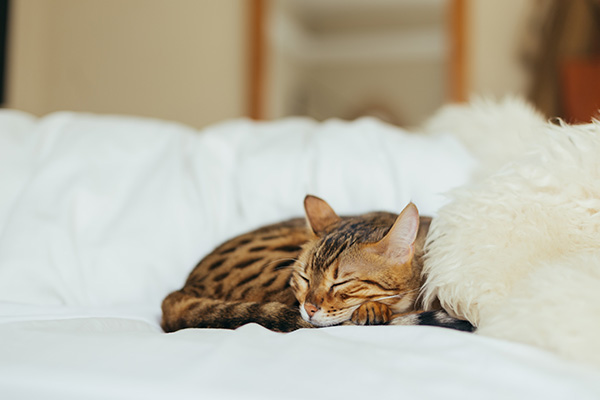
A decrease in appetite in cats is often a sign of illness, especially if your cat is exhibiting other symptoms at the same time. One of the medical conditions that cause a loss of appetite in cats is kidney disease. As kidney disease progresses, cats get more pickier and don’t want to eat as much as they used to.
There are some food-related concerns you should consider if your cat is not eating. Your dog may not be eating if there is a recent switch in cat food that tastes or smells differently than your cat’s old food. Your kitty may not be eating if you go from home-cooked meals or wet cat food to dry food. Some cats are just picky and refuse to eat if you’re feeding them in situations where they aren’t comfortable.
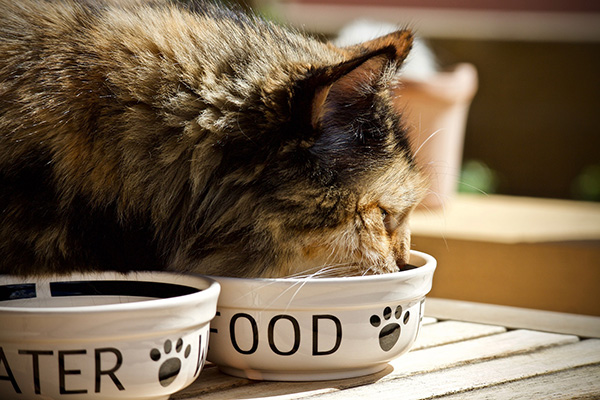
Has your cat recently been put on medication? Often, treatment of the disease or medicine might upset their stomachs.
Often recent vaccination and treatment of a disease can give nausea and make your kitty not eat. Certain drugs are upsetting for cats’ stomachs. The medications and treatments that cause loss of appetite include certain antibiotics, chemotherapy, or non-steroidal anti-inflammatory drugs.
Cats who suffer from stress or anxiety may not eat well. An upheaval in a cat’s life could affect its hunger as well. Some cats eat less or even stop eating when they get anxious.
Your cat may become anxious if traveling or moving to another place with the absence of a family member, the addition of a new pet in the family, or drastic weather changes. It is significant to dedicate quality time to your kitty and ensure that its needs are being met.
When something is ingested by your kitty, it usually takes between 10 to 24 hours to move through its digestive tract.
Any mouth, gum, or teeth problems of your cat may cause them to refuse to eat. They might not be eating properly because something in their mouth is causing pain and not letting them swallow properly. Most adult and senior cats have some stage of dental disease.
Sometimes, trauma to your cat’s mouth like loose teeth or an injury doesn’t allow them to eat as much as they used to. Have your kitty checked for a mouth injury, a broken tooth, infection, gum disease, or even an oral tumor.
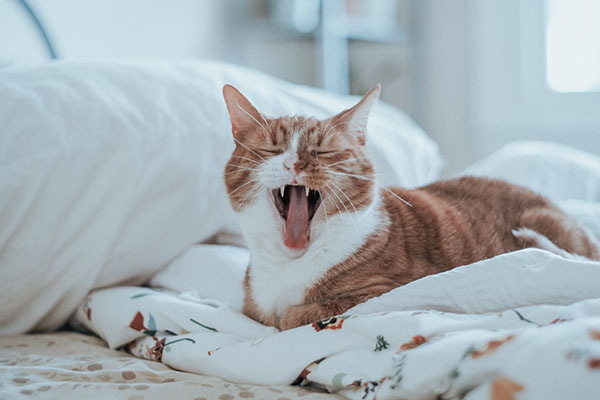
Your cat may be finding other food sources and getting meals elsewhere. If your cat spends time outside, it might be catching mice. Sometimes, a neighbor or a child home from college may be feeding your kitty in-between normal mealtimes without you knowing it.
Your cat may have a food allergy or food sensitivity to one or more ingredients in its diet. Another reason your cat is not eating is the food’s ingredients. If your cat is sensitive to one or more of them, you may find the food untouched. A food intolerance might cause gastrointestinal signs like decreased appetite, vomiting, and diarrhea. Choose food without the ingredient your cat is sensitive to.
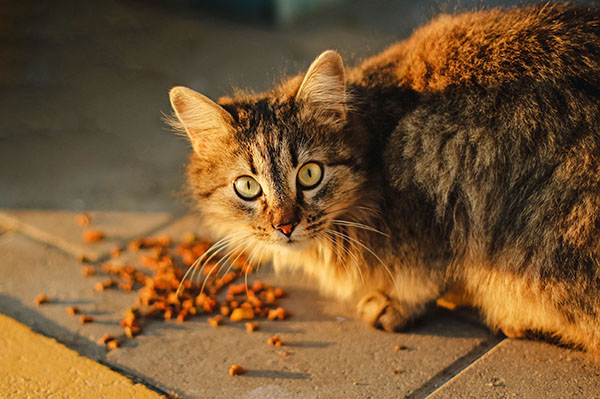
Cats are curious animals and love to explore new sights, smells, and tastes. are notorious for ingesting such as thread, wool, paper, plants, and small toys. Many cats that have ingested a foreign body will exhibit symptoms like vomiting, lack of appetite, lethargy, diarrhea, and abdominal tenderness. Sometimes the foreign body may be able to pass on its own while in some cases, exploratory surgery is recommended.
Solutions, for why your cat is not eating, will depend on the underlying causes for your cat losing their appetite. It’ll depend on what you and your vet determine to be the cause of the problem. In cases where your cat stops eating but then resumes a few days later, it might be nothing to get concerned about. However, if it doesn’t clear up, it might be time to take some action or seek professional help.
Your cat not eating or drinking water might be a serious issue. If you ever have questions about your cat’s health and appetite, we recommend reaching out to a vet. The vet will ask about your cat’s recent medical history and whether you have noticed any other symptoms.
There can be some medical problems and you should take your kitty to a vet. Check for signs of dehydration, fever, lethargy, vomiting, and diarrhea. If all or a few of them are present, consider it an emergency. Speak to your vet as early as possible and follow expert advice on providing nutrition for your cat.
One way is to make a food schedule and stick to it. Give your cat the same food at the same times every day. The structured feeding schedule is when you have a set time scheduled to feed your kitty. On that planned feeding time you fill your cat’s bowl as usual.
WOpet smart feeder gives you peace of mind by feeding your cat regularly, even if you are at work or on a vacation. The smart cat feeder develops healthy eating habits for your cats!
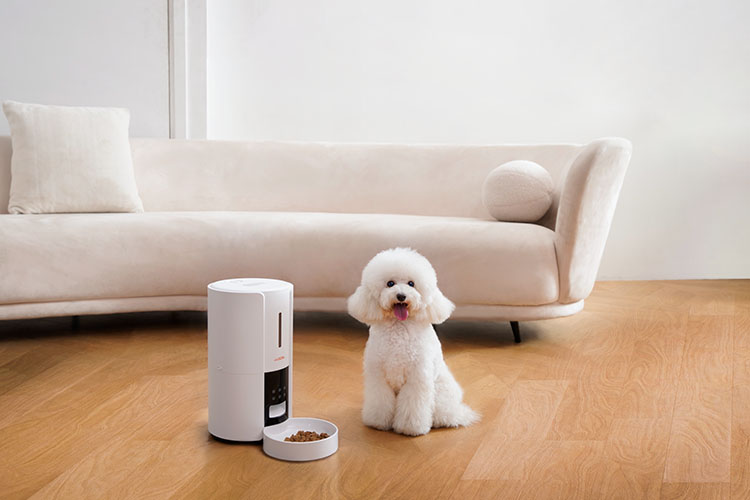
There are some simple short-term steps you can take like feeding your kitty something that can stimulate its appetite. Often medications can be given to boost your cat’s appetite. Try some medications that can stimulate your cat’s appetite and control nausea. These medications are commonly given orally or administered by adding to their food.
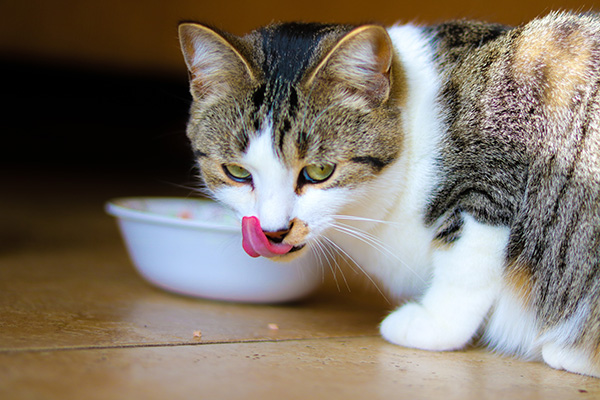
Sometimes your cat’s diets are not particularly tasty, especially if your kitty is used to regular treats or human food. Give your cat treats when they’ve earned them, not just when they ask for them.
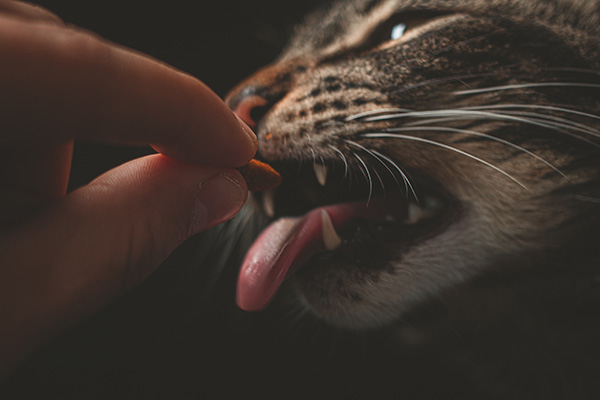
If the cat is not getting essential nutrients to maintain optimal health, consider giving your cat nutritional supplements. They also address certain medical issues and could improve the health of your kitty. Nutritional supplements should only be given with a vet’s approval.
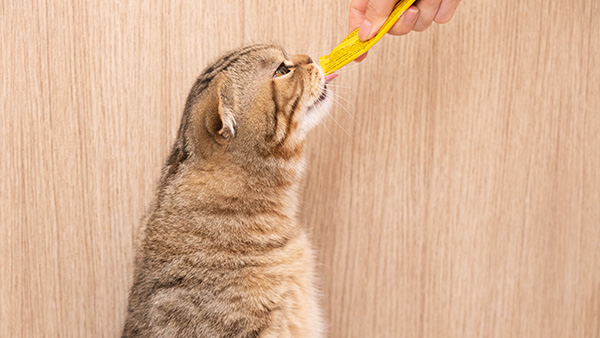
Loss of appetite in cats should never be ignored, even if your cat’s behavior has not changed. It often signals an underlying medical problem and must be examined by a vet. Finding and treating the underlying cause of why your cat is not eating is the best way to approach this problem.
Hope you have enjoyed reading the article. If you have any questions, please do let us know!
Popular Post

Why Does My Cat Cough After Drinking Water? 8 Potential Reasons
Mar 13, 2023
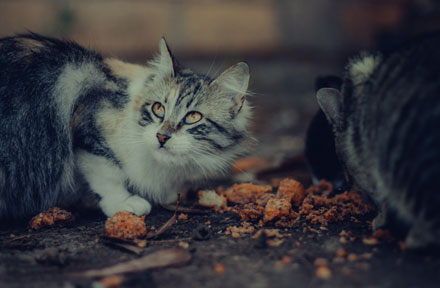
My Cat Only Eats A Little at A Time - What to Do?
Feb 27, 2023

What to Feed a Sick Dog With No Appetite? [2024 Guide]
May 16, 2023

Why Is My Dog Being Destructive All of A Sudden?
Feb 04, 2023
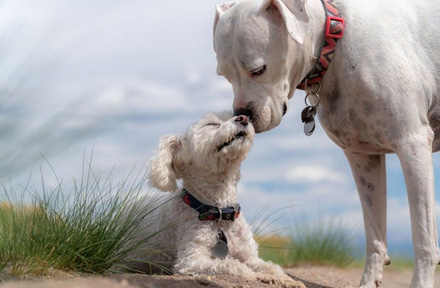
Do Puppies Miss Their Moms
Feb 11, 2023
Copyright © 2024 WOPET. All Rights Reserved.